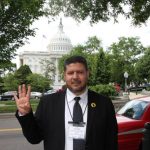Ali Soufan – The Daily Beast –
It’s been six years since the 9/11 mastermind’s death—and in the shadows, al Qaeda has been quietly amassing power.
This week marks six years since the death of Osama bin Laden, an event that, for me, sparks bittersweet memories. On the one hand, I felt that justice had finally caught up with a vicious terrorist who killed thousands of Americans, including my friend and mentor John O’Neill, who died in the act of rescuing dozens of people from the crumbling Twin Towers. /react-text
On the other hand, I worried that al Qaeda without bin Laden might prove even more dangerous. As I wrote in New York Times, “With al Qaeda on the decline, regional groups that had aligned themselves with the network may return to operating independently, making them harder to monitor and hence deadlier.”
To judge by the preoccupations of U.S. media coverage, one might think this assessment overly pessimistic. Different geopolitical villains, from the Islamic State (ISIS) /react-text react-text: 229 to the despotic regime of Kim Jong-Un , now fill our broadsheets and broadcasts. By comparison, al Qaeda seems like yesterday’s news. But in reality, the situation is even worse than I predicted.
react-text: 236 Al Qaeda has not, in fact, declined. The group remains in control of all its major global factions, with the exception of the Islamic State (which spun off in 2014). Away from the glare of American attention, those factions have been marshaling their forces.
react-text: 238 The membership rosters of these franchises make for sobering reading. Al Qaeda in the Arabian Peninsula is thought to have more than 4,000 fighters under its command. In Somalia, al Shabaab has more than 7,000. In Syria, al Nusra boasts more than 20,000. Each of these numbers represents a vast increase from six years ago. Meanwhile, al Qaeda in the Islamic Maghreb has made millions of dollars from ransom payments, the Taliban is back in control of several Afghan provinces, and al Qaeda’s Southeast Asian affiliate, Jemaah Islamiyah, which had 31 extremist madrassas when it carried out the Bali nightclub bombing in 2002, now has 66. Overseeing this vast empire, al Qaeda’s central command—known within the group as “Khorasan”—continues to operate from its holdfasts in Waziristan.
Whereas on 9/11 al Qaeda had a few hundred members, almost all of them based in a single country, today it enjoys multiple safe havens across the world. In Syria, Yemen, and other theaters, it has grown its power still further by inserting itself into local civil wars and wider geopolitical conflicts. Compared to the brutality of Islamic State and its allies, there is a temptation to view al Qaeda franchises as “moderate” factions in these conflicts, or even potential allies—especially when they work to distance themselves from the al Qaeda “brand,” as many have tried to do over the past few years.
This temptation must be overcome. These groups are neither moderate nor our friends, and we must avoid treating them as such. Unfortunately, various Middle East powers have made this problem worse by stoking sectarianism across the region. By so doing, they had hoped to gain the upper hand over their regional rivals; but in reality, the only beneficiaries have been extremists like al Qaeda. These countries must stop fueling conflicts and instead use every means at their disposal to end them. The West should stand ready to assist in this process.
Above all, we must avoid the trap of regarding al Qaeda as a spent force simply because we have more pressing immediate problems. I vividly remember the years prior to 9/11, when I and a handful of my colleagues in the law enforcement and intelligence communities tried in vain to alert the Clinton and Bush Administrations to the danger. Even after the USS Cole bombing of 2000, an outrageous attack that killed 17 U.S. sailors, America took no effective action against al Qaeda. The result of this failure to act was the far worse carnage of 9/11. We must not make the same mistake again.
____________________
http://www.thedailybeast.com/articles/2017/05/07/al-qaeda-is-stronger-now-than-when-bin-laden-was-killed?source=facebook&via=desktop
Photo: JEWEL SAMAD/GETTY





